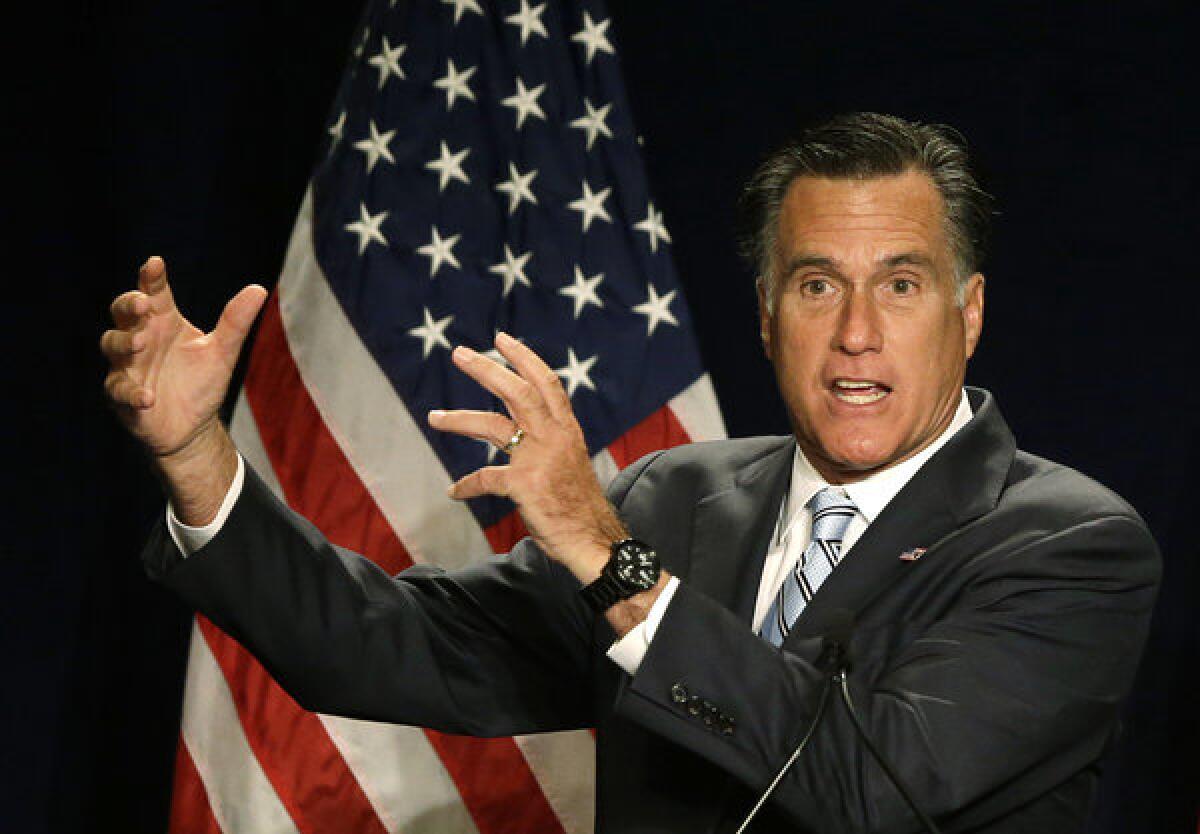Daum: Romney’s sorry state

When it comes to apologies, some people are like scent hounds: They can sniff them out anywhere. This is especially true when it comes to the supposed regrets and self-hatred of President Obama. Though he began his term with a series of speeches in Europe, Latin America and the Middle East in which, according to several fact-checking sources, the words “apology” or “I’m sorry” were never once uttered, his opponents nonetheless decided to construe the trips as some sort of mea culpa (make that Americana culpa) world tour. (Can’t you just picture it on a heavy metal concert T-shirt?)
Hence the concept of the “apology tour.” It originated in April 2009, when Karl Rove, advisor to George W. Bush, wrote a Wall Street Journal op-ed saying, “Mr. Obama ... assumes that if he confesses America’s sins, other nations will confess theirs and change.”
Rove was known as Bush’s strategy “architect,” but he wasn’t necessarily a brilliant ad man. The phrase “apology tour” appeared not in the column but in the headline, which means it was almost definitely coined not by Rove but by an editor on headline writing duty that day. If that editor worked in marketing instead of journalism, he or she probably would be running an agency now because the idea of Obama as “apologizer in chief” has turned into a winning brand, a key selling point for Republicans looking to paint the president as un-American.
LETTERS: Mitt Romney, meet the 47%
Mitt Romney is among those who have long trafficked in the Obama-as-apologist narrative (that is, when he’s not complaining about the Obama campaign’s refusal to apologize for digs against his record at Bain Capital). Before things went sour for Romney this week — when a video surfaced in which he wrote off the 47% of Americans who “will vote for the president no matter what” and are, among other things, “dependent on government” and “pay no income tax” — Romney was already struggling to control his latest version of the apologist-in-chief message.
After the embassy attacks in Cairo and Benghazi, Libya, he accused the president of “apologizing for our values” and “sympathizing with those who waged the attacks.” But as the facts and timeline became clear, Romney’s censure was exposed as premature and irrelevant. Not that any of this should be a surprise from the man who wrote a book called “No Apology: The Cause for American Greatness” (look for his next release: “Obamaphiles in Paradise: How Arugula-eating, Prius-driving, Ira Glass-loving Entitlement Seekers Manage to Avoid Federal Taxes.”)
Ultimately, though, his “apologygate” says less about the limits of Romney’s offensive game than it does about the changing nature of what it means to say you’re sorry. At some point in recent history, being able to admit fault went from a virtue to a liability.
COMMENTARY AND ANALYSIS: Obama vs. Romney
Once upon a time, children were taught to apologize for breaking the neighbor’s window because honesty and genuine regret reflected strength of character. Today, political leaders demand apologies from their opponents because it’s a sure way to make them look weak of character. Apology these days is an eject button, the thing you do when all damage-control efforts have failed and there’s nothing left to lose. To say you’re sorry is not to admit regret as much as to admit you’ve been backed into a corner.
Romney, notably, is having none of that, although he has displayed his champion backpedaling abilities, saying his comments were “off the cuff” and “not elegantly stated.” Given that apology-seeking is a bipartisan tactic, liberals will surely find ways to portray his conclusions about the 47% as even more extreme than they were, demanding that he apologize to all those stung by the humiliation of his insult. Republicans, in turn, will insist that Romney was right on a technicality: 46.4% of American households don’t pay federal income tax.
There will be shouting and gloating and cable news bloviating. What there will not be, most likely, is an apology.
After all, as Ali MacGraw told us eons ago, love means never having to say you’re sorry. Maybe it’s as true now as it was then — especially if you love America.
More to Read
Start your day right
Sign up for Essential California for news, features and recommendations from the L.A. Times and beyond in your inbox six days a week.
You may occasionally receive promotional content from the Los Angeles Times.







